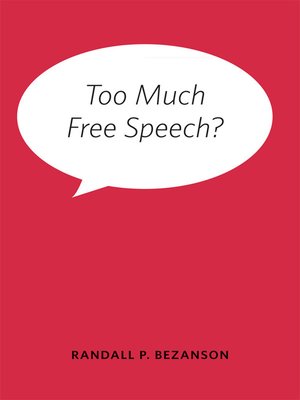
Sign up to save your library
With an OverDrive account, you can save your favorite libraries for at-a-glance information about availability. Find out more about OverDrive accounts.
Find this title in Libby, the library reading app by OverDrive.



Search for a digital library with this title
Title found at these libraries:
| Library Name | Distance |
|---|---|
| Loading... |
Randall P. Bezanson takes up an essential and timely inquiry into the Constitutional limits of the Supreme Court's power to create, interpret, and enforce one of the essential rights of American citizens. Analyzing contemporary Supreme Court decisions from the past fifteen years, Bezanson argues that judicial interpretations have fundamentally and drastically expanded the meaning and understanding of "speech." Bezanson focuses on judgments such as the much-discussed Citizens United case, which granted the full measure of constitutional protection to speech by corporations, and the Doe vs. Reed case in Washington state, which recognized the signing of petitions and voting in elections as acts of free speech. In each case study, he questions whether the meaning of speech has been expanded too far and critically assesses the Supreme Court's methodology in reaching and explaining its expansive conclusions. |
Cover
Title Page
Copyright Page
Contents
I. Introduction
II. New Speakers
Chapter 1. Corporations as Speakers: Citizens United v. Federal Election Commission, 130 S. Ct. 876
Chapter 2. Government and Its Speech Forum: Pleasant Grove City v. Summum, 129 S. Ct. 1125 (2009)
III. Forms of Speech
Chapter 3. Expressive Conduct Unleashed: Hurlye v. Irish-American Gay, Lesbian and Bisexual Group of
Chapter 4. Speech out of Thin Air: Boy Scouts of America v. Dale, 530 U.S. 640
IV. Voting as Speaking, Expressive Association, and Privacy
Chapter 5. The Secret Ballot: Voting as Speech: Doe v. Reed, 130 S. Ct. 2811 (2010)
V. Is There Such a Thing as Too Much Free Speech?
Notes
Index
| "A timely and important exploration of recent Supreme Court decisions that extend the meaning of free speech to include, for instance, the expression of political views by corporations. The writing is clear, lively, and interesting, and it addresses essential matters of public concern such as the expansion of government speech at the expense of private expression."
—Joan DelFattore, author of Knowledge in the Making: Academic Freedom and Free Speech in America's Schools and Universities
|
|
Randall P. Bezanson is the David H. Vernon Professor of Law at the University of Iowa and the author of Art and Freedom of Speech, How Free Can Religion Be?, and How Free Can the Press Be?







